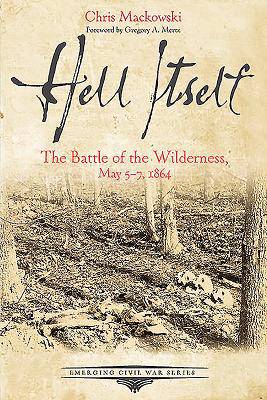
- Afhalen na 1 uur in een winkel met voorraad
- Gratis thuislevering in België vanaf € 30
- Ruim aanbod met 7 miljoen producten
- Afhalen na 1 uur in een winkel met voorraad
- Gratis thuislevering in België vanaf € 30
- Ruim aanbod met 7 miljoen producten
Zoeken
Omschrijving
Finalist, 2016, Army Historical Foundation Distinguished Book Award
Soldiers called it one of the "waste places of nature" and "a region of gloom"--the Wilderness of Virginia, seventy square miles of dense, second-growth forest known as "the dark, close wood."
"A more unpromising theatre of war was never seen," said another.
Yet here, in the spring of 1864, the Civil War escalated to a new level of horror.
Ulysses S. Grant, commanding all Federal armies, opened the campaign with a vow to never turn back. Robert E. Lee, commanding the Confederate Army of Northern Virginia, moved into the Wilderness to block Grant's advance. Immovable object intercepted irresistible force--and the Wilderness burst into flame.
With the forest itself burning around them, men died by the thousands. The armies bloodied each other without mercy and, at times, without any semblance of order. The brush grew so dense, and the smoke hung so thick, men could not see who stood next to them--or in front of them. "This, viewed as a battleground, was simply infernal," a Union soldier later said.
It was, said another, "hell itself."
Driven by desperation, duty, confusion, and fire, soldiers on both sides marveled that anyone might make it out alive.
For more than a decade, Chris Mackowski has guided visitors across the battlefields of the Overland Campaign. Now in Hell Itself he invites readers of the Emerging Civil War Series to join him in the Wilderness--one of the most storied battlefields of the entire Civil War.
Soldiers called it one of the "waste places of nature" and "a region of gloom"--the Wilderness of Virginia, seventy square miles of dense, second-growth forest known as "the dark, close wood."
"A more unpromising theatre of war was never seen," said another.
Yet here, in the spring of 1864, the Civil War escalated to a new level of horror.
Ulysses S. Grant, commanding all Federal armies, opened the campaign with a vow to never turn back. Robert E. Lee, commanding the Confederate Army of Northern Virginia, moved into the Wilderness to block Grant's advance. Immovable object intercepted irresistible force--and the Wilderness burst into flame.
With the forest itself burning around them, men died by the thousands. The armies bloodied each other without mercy and, at times, without any semblance of order. The brush grew so dense, and the smoke hung so thick, men could not see who stood next to them--or in front of them. "This, viewed as a battleground, was simply infernal," a Union soldier later said.
It was, said another, "hell itself."
Driven by desperation, duty, confusion, and fire, soldiers on both sides marveled that anyone might make it out alive.
For more than a decade, Chris Mackowski has guided visitors across the battlefields of the Overland Campaign. Now in Hell Itself he invites readers of the Emerging Civil War Series to join him in the Wilderness--one of the most storied battlefields of the entire Civil War.
Specificaties
Betrokkenen
- Auteur(s):
- Uitgeverij:
Inhoud
- Aantal bladzijden:
- 192
- Taal:
- Engels
- Reeks:
Eigenschappen
- Productcode (EAN):
- 9781611213157
- Verschijningsdatum:
- 30/04/2016
- Uitvoering:
- Paperback
- Formaat:
- Trade paperback (VS)
- Afmetingen:
- 152 mm x 226 mm
- Gewicht:
- 317 g

Alleen bij Standaard Boekhandel
+ 47 punten op je klantenkaart van Standaard Boekhandel
Beoordelingen
We publiceren alleen reviews die voldoen aan de voorwaarden voor reviews. Bekijk onze voorwaarden voor reviews.











